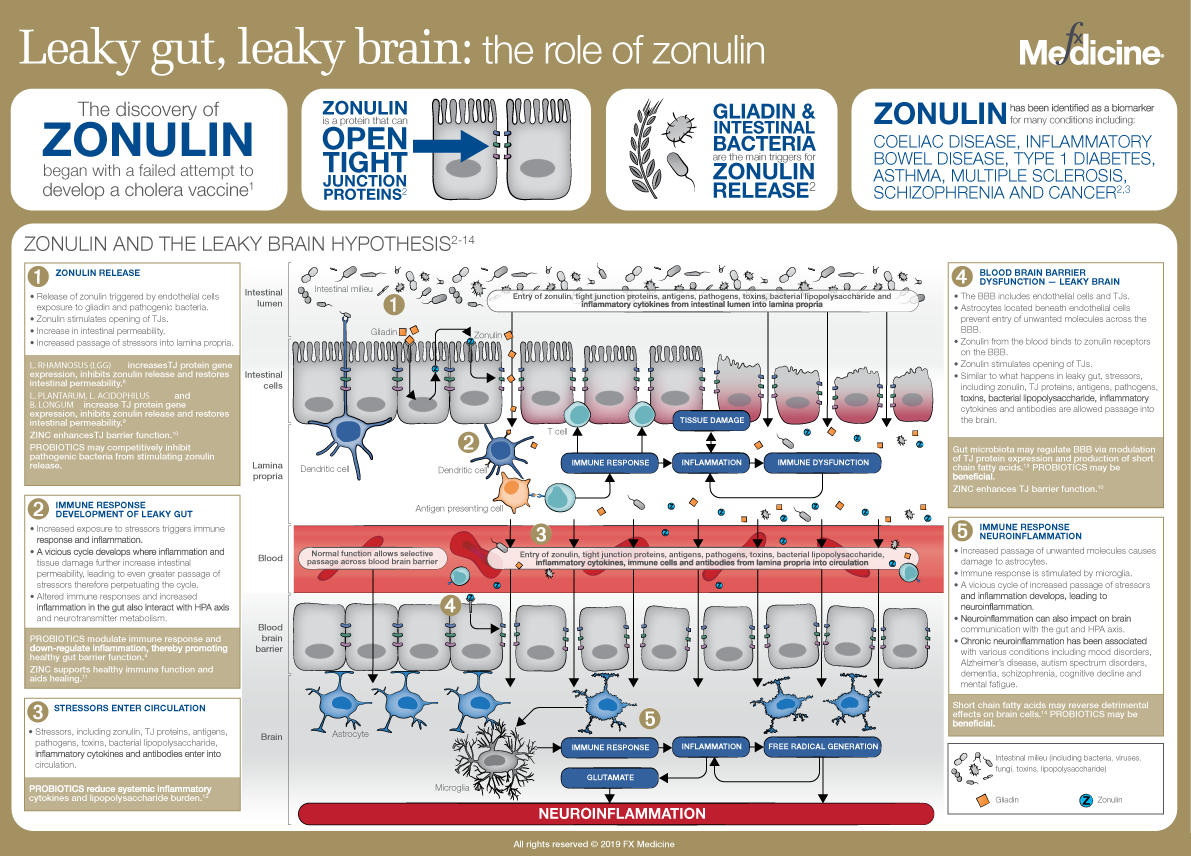
In recent years an amazing discovery has advanced our understanding of intestinal permeability.
In 2000, Dr Alessio Fasano and his team discovered a molecule responsible for modulating intestinal tight junctions (TJs) known as zonulin. To date, zonulin is the only human protein known to reversibly regulate intestinal permeability.
Based on Dr Fasano’s research, we now know two key triggers that augment zonulin expression with implications for the development of numerous autoimmune conditions, including coeliac disease (CD) and type 1 diabetes. These triggers are gluten and gut bacteria.
Gliadin from gluten causes zonulin levels to increase both in those people who have CD and those who do not. Changes in gut microbiota have also been observed to trigger the zonulin pathway leading to a loss of intestinal barrier function. This results in the passage of harmful molecules into the bloodstream and the activation of inflammatory and autoimmune processes. It is also conceivable that zonulin participates in the physiological regulation of intercellular TJs of the vascular endothelium, including the blood-brain barrier (BBB) with wide implications for mood and cognition.
In this infographic we review zonulin research, what this means for the development of disease and the protective actions of probiotics and zinc.
References
- Barlow E. Celiac disease and the unforeseen path to discovery. Celiac disease foundation 2014. Viewed 24 March 2016. [Link]
- Fasano A. Zonulin, regulation of tight junctions, and autoimmune diseases. Ann N Y Acad Sci 2012;1258(1):25-33. [Full text]
- Fasano A. Zonulin and its regulation of intestinal barrier function: the biological door to inflammation, autoimmunity, and cancer. Physiol Rev 2011;91(1):151-175. [Full text]
- Kelly JR, Kennedy PJ, Cryan JF, et al. Breaking down the barriers: the gut microbiome, intestinal permeability and stress-related psychiatric disorders. Front Cell Neurosci 2015;9:392. [Full text]
- Lu R, Wang W, Uzzau S, et al. Affinity purification and partial characterization of the zonulin/zonula occludens toxin (Zot) receptor from human brain. J Neurochem 2000;74(1):320-326. [Full text]
- Zhou L, Foster JA. Psychobiotics and the gut–brain axis: in the pursuit of happiness. Neuropsychiatr Dis Treat 2015;11:715-723. [Full text]
- Fasano A. Surprises from celiac disease. Scientific American 2009;8:32-39. [Abstract]
- Orlando A, Linsalata M, Notarnicola M, et al. Lactobacillus GG restoration of the gliadin induced epithelial barrier disruption: the role of cellular polyamines. BMC Microbiol 2014;31;14:19. [Full text]
- Liu Z, Li C, Huang M, et al. Positive regulatory effects of perioperative probiotic treatment on postoperative liver complications after colorectal liver metastases surgery: a double-center and double-blind randomized clinical trial. BMC Gastroenterol 2015;15:34. [Full text]
- Wang X, Valenzano MC, Mercado JM, et al. Zinc supplementation modifies tight junctions and alters barrier function of CACO-2 human intestinal epithelial layers. Dig Dis Sci 2013;58(1):77-87. [Abstract]
- Braun L, Cohen M. Herbs and natural supplements: an evidence-based guide, 4th ed. Sydney: Churchill Livingstone Elsevier, 2015.
- Bested AC, Logan AC, Selhub E. Intestinal microbiota, probiotics and mental health: from Metchnikoff to modern advances: part III – convergence toward clinical trials. Gut Pathogens 2013;5:4. [Full text]
- Braniste V, Al-Asmath M, Kowal C, et al. The gut microbiota influences blood-brain barrier permeability in mice. Sci Transl Med 2014;6(263):263ra158. [Abstract]
- Rea K, Dinan TG, Cryana JF. The microbiome: a key regulator of stress and neuroinflammation. Neurobiol Stress. Available online 4 March 2016. [Link]
This image by FX Medicine is licensed under a Creative Commons Attribution-NonCommercial-NoDerivatives 4.0 International License.
More information about how to share/use the infographics for personal use.
If you interested in using any FX Medicine content for commercial use please contact us.
DISCLAIMER:
The information provided on FX Medicine is for educational and informational purposes only. The information provided on this site is not, nor is it intended to be, a substitute for professional advice or care. Please seek the advice of a qualified health care professional in the event something you have read here raises questions or concerns regarding your health.



